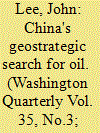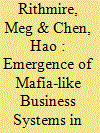| Srl | Item |
| 1 |
ID:
116605


|
|
|
|
|
| Publication |
2012.
|
| Summary/Abstract |
In 2000, Asia analyst Robert A. Manning presciently argued that the likelihood of future conflict over energy resources would increase as rising Asian giants such as China shifted away from an economic toward a strategic approach to energy security.1 Since then, as China's energy consumption has expanded and its rise has become the dominant geopolitical issue of our time, Beijing's energy security policy has become one of the major discussion topics.
|
|
|
|
|
|
|
|
|
|
|
|
|
|
|
|
| 2 |
ID:
183235


|
|
|
|
|
| Summary/Abstract |
A large body of literature on state–business relations in China has examined the political role of capitalists and collusion between the state and the private sector. This paper contributes to that literature and understanding of the internal differentiation among China's business elites by documenting the emergence of a particular kind of large, non-state business group that we argue is more akin to a mafia system than any standard definition of a firm. Drawing on large-N descriptive data as well as deep ethnographic and documentary research, we argue that mafia-like business systems share organizational principles (plunder and obfuscation) and means of growth and survival (relations of mutual endangerment and manipulation of the financial system). Understanding the particular moral economy that underlies mafia-like business systems and their interactions with the state challenges methodological foundations of research on China's political economy and helps to explain recent conflict between high-profile business people and the state.
|
|
|
|
|
|
|
|
|
|
|
|
|
|
|
|
| 3 |
ID:
119683


|
|
|
|
|
| Publication |
2012.
|
| Summary/Abstract |
There is little doubt that China's international reemergence represents one of the most significant events in modern history. As China's political economy gains in importance, its interactions with other major political economies will shape global values, institutions, and policies, thereby restructuring the international political economy. Drawing on theories and concepts in comparative capitalism, the author envisages China's reemergence as generating Sino-capitalism-a capitalist system that is already global in reach but one that differs from Anglo-American capitalism in important respects. Sino-capitalism relies more on informal business networks than legal codes and transparent rules. It also assigns the Chinese state a leading role in fostering and guiding capitalist accumulation. Sino-capitalism, ultimately, espouses less trust in free markets and more trust in unitary state rule and social norms of reciprocity, stability, and hierarchy.
After conceptualizing Sino-capitalism's domestic political economy, the author uses the case of China's efforts to internationalize its currency, the yuan or renminbi, to systematically illustrate the multifarious manner in which the domestic logic of Sino-capitalism is expressed at the global level. Rather than presenting a deterministic argument concerning the future international role of China, he argues that China's stance and strategy in the international political economy hew quite closely to Sino-capitalism's hybrid compensatory institutional arrangements on the domestic level: state guidance; flexible and entrepreneurial networks; and global integration. Sino-capitalism therefore represents an emerging system of global capitalism centered on China that is producing a dynamic mix of mutual dependence, symbiosis, competition, and friction with the still dominant Anglo-American model of capitalism.
|
|
|
|
|
|
|
|
|
|
|
|
|
|
|
|